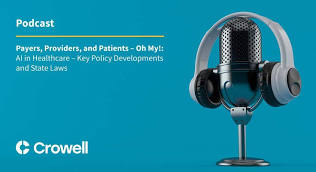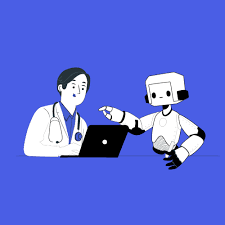AI and Healthcare: Transforming the Future of Medicine
The integration of artificial intelligence (AI) into healthcare is revolutionizing the way medical professionals diagnose, treat, and manage diseases. With its ability to analyze vast amounts of data quickly and accurately, AI is poised to transform the healthcare industry, leading to improved patient outcomes and more efficient care delivery.
Enhancing Diagnostic Accuracy
One of the most significant impacts of AI in healthcare is its potential to enhance diagnostic accuracy. Machine learning algorithms can analyze medical images such as X-rays, MRIs, and CT scans with remarkable precision. These algorithms are trained on thousands of images to recognize patterns that may be imperceptible to the human eye.
For example, AI systems have demonstrated proficiency in detecting early signs of diseases like cancer, often outperforming human radiologists. This capability not only speeds up diagnosis but also reduces the likelihood of errors, leading to earlier interventions and better patient outcomes.
Personalized Treatment Plans
AI’s ability to process large datasets allows for the creation of personalized treatment plans tailored to individual patients. By analyzing genetic information, lifestyle factors, and historical health data, AI can help doctors determine the most effective treatment options for each patient.
This personalized approach is particularly beneficial in fields like oncology, where treatments can be optimized based on a patient’s unique genetic makeup. As a result, patients receive therapies that are more likely to succeed while minimizing potential side effects.
Streamlining Administrative Tasks
Apart from clinical applications, AI is also streamlining administrative tasks within healthcare facilities. Natural language processing (NLP) technologies are being used to automate documentation processes by transcribing doctor-patient interactions into electronic health records (EHRs). This automation reduces the administrative burden on healthcare providers, allowing them more time for direct patient care.
Additionally, AI-driven systems can optimize scheduling and resource allocation within hospitals by predicting patient admission rates and managing staff assignments efficiently. This leads to reduced wait times and improved resource management across healthcare settings.
Challenges and Ethical Considerations
Despite its many benefits, integrating AI into healthcare comes with challenges and ethical considerations. Data privacy concerns are paramount as sensitive health information is processed by AI systems. Ensuring robust security measures and maintaining patient confidentiality are critical aspects that need continuous attention.
Moreover, there is a need for transparency in how AI algorithms make decisions. Understanding these decision-making processes helps build trust among both medical professionals and patients who rely on these technologies for critical health-related decisions.
The Road Ahead
The future of AI in healthcare holds immense promise as technology continues to advance rapidly. Collaborative efforts between technologists and medical professionals will be essential in developing ethical frameworks that guide responsible implementation while maximizing benefits for patients worldwide.
As we look ahead towards this transformative era in medicine driven by artificial intelligence innovation—one thing remains clear: harnessing this powerful tool has the potential not only improve individual lives but also reshape entire communities through enhanced access quality care globally!
Exploring AI in Healthcare: Benefits, Challenges, and Ethical Considerations
- How is artificial intelligence (AI) being used in healthcare?
- What are the benefits of incorporating AI into the healthcare industry?
- Are there any risks or challenges associated with using AI in healthcare?
- How does AI improve diagnostic processes and patient outcomes in healthcare?
- What role does machine learning play in personalized medicine and treatment plans?
- What ethical considerations need to be addressed when implementing AI in healthcare?
- How can AI assist with administrative tasks and resource management within healthcare facilities?
How is artificial intelligence (AI) being used in healthcare?
Artificial intelligence (AI) is being utilized in healthcare to enhance various aspects of patient care and operational efficiency. AI technologies are employed for analyzing medical images, such as X-rays and MRIs, to improve diagnostic accuracy and speed. Machine learning algorithms can detect patterns and anomalies that may be missed by the human eye, leading to earlier detection of conditions like cancer. Additionally, AI is used to develop personalized treatment plans by analyzing a patient’s genetic information, lifestyle factors, and medical history, which helps in tailoring therapies to individual needs. Beyond clinical applications, AI streamlines administrative tasks by automating documentation processes and optimizing scheduling within healthcare facilities. This reduces the administrative burden on healthcare providers and allows them to focus more on patient care. Despite these advancements, it is crucial to address challenges such as data privacy and ethical considerations in the deployment of AI technologies in healthcare.
What are the benefits of incorporating AI into the healthcare industry?
Incorporating AI into the healthcare industry offers numerous benefits that enhance both patient care and operational efficiency. AI-driven technologies can significantly improve diagnostic accuracy by analyzing medical images and data with precision, often identifying patterns that might be missed by the human eye. This leads to earlier and more accurate diagnoses, which are crucial for effective treatment. Additionally, AI can personalize treatment plans by processing vast amounts of patient data, including genetic information and medical history, to tailor therapies to individual needs, thereby improving outcomes and minimizing side effects. Beyond clinical applications, AI streamlines administrative tasks such as scheduling, documentation, and resource management, freeing up healthcare professionals to focus more on patient care. Overall, AI has the potential to transform healthcare delivery by making it more efficient, personalized, and accessible.
Are there any risks or challenges associated with using AI in healthcare?
The use of AI in healthcare, while promising, does come with several risks and challenges that need to be addressed. One of the primary concerns is data privacy and security, as AI systems often require access to vast amounts of sensitive patient information, making them potential targets for cyberattacks. Additionally, there is the risk of algorithmic bias, where AI systems may inadvertently perpetuate existing biases present in the data they are trained on, potentially leading to disparities in care. The lack of transparency in some AI algorithms can also pose a challenge, as it may be difficult for healthcare providers to understand how certain decisions are made, which is crucial for maintaining trust and accountability. Furthermore, integrating AI into existing healthcare systems requires significant investment and training, which can be a barrier for some institutions. Addressing these challenges requires a collaborative approach involving technologists, healthcare professionals, policymakers, and ethicists to ensure that AI is implemented safely and equitably.
How does AI improve diagnostic processes and patient outcomes in healthcare?
AI significantly improves diagnostic processes and patient outcomes in healthcare by leveraging advanced algorithms to analyze medical data with precision and speed. Machine learning models can process vast amounts of information, such as medical images, lab results, and patient histories, to identify patterns and anomalies that may be missed by human practitioners. This capability enhances the accuracy of diagnoses, enabling early detection of diseases like cancer or neurological disorders. Furthermore, AI systems can provide personalized insights based on a patient’s unique health profile, assisting doctors in crafting tailored treatment plans that optimize effectiveness while minimizing side effects. By reducing diagnostic errors and facilitating timely interventions, AI contributes to better overall patient outcomes and more efficient healthcare delivery.
What role does machine learning play in personalized medicine and treatment plans?
Machine learning plays a pivotal role in personalized medicine and treatment plans by leveraging algorithms to analyze vast amounts of patient data and identify patterns that inform individualized care. Through the analysis of genetic information, patient history, lifestyle factors, and treatment outcomes, machine learning algorithms can help healthcare providers tailor treatment plans to each patient’s unique needs. By predicting how patients may respond to different interventions and medications, machine learning enables more precise and effective treatment strategies, ultimately leading to improved patient outcomes and a more personalized approach to healthcare delivery.
What ethical considerations need to be addressed when implementing AI in healthcare?
When implementing AI in healthcare, several ethical considerations must be addressed to ensure the responsible use of technology. Privacy and data security are paramount, as AI systems often require access to sensitive patient information. Safeguarding this data against breaches and misuse is crucial to maintaining patient trust. Additionally, there is a need for transparency in AI decision-making processes; understanding how algorithms reach conclusions is essential for both healthcare providers and patients. Bias in AI systems is another significant concern, as biased algorithms can lead to disparities in treatment outcomes. Ensuring that AI tools are trained on diverse datasets can help mitigate this risk. Furthermore, the potential for AI to displace human jobs raises questions about the future roles of healthcare professionals and the importance of preserving human oversight in clinical decisions. Addressing these ethical issues requires collaboration between technologists, ethicists, and medical professionals to create frameworks that prioritize patient welfare and equity.
How can AI assist with administrative tasks and resource management within healthcare facilities?
AI can significantly enhance administrative tasks and resource management within healthcare facilities by automating routine processes and optimizing operations. For instance, AI-powered systems can streamline appointment scheduling by predicting patient no-show rates and suggesting optimal times for appointments, thus improving efficiency. Natural language processing (NLP) technologies can automate the transcription of doctor-patient interactions into electronic health records (EHRs), reducing the time healthcare professionals spend on documentation. Additionally, AI algorithms can analyze data to forecast patient admission rates and manage staff assignments more effectively, ensuring that resources are allocated where they are most needed. By reducing administrative burdens and improving resource management, AI allows healthcare providers to focus more on patient care, ultimately enhancing the quality of service delivered to patients.



